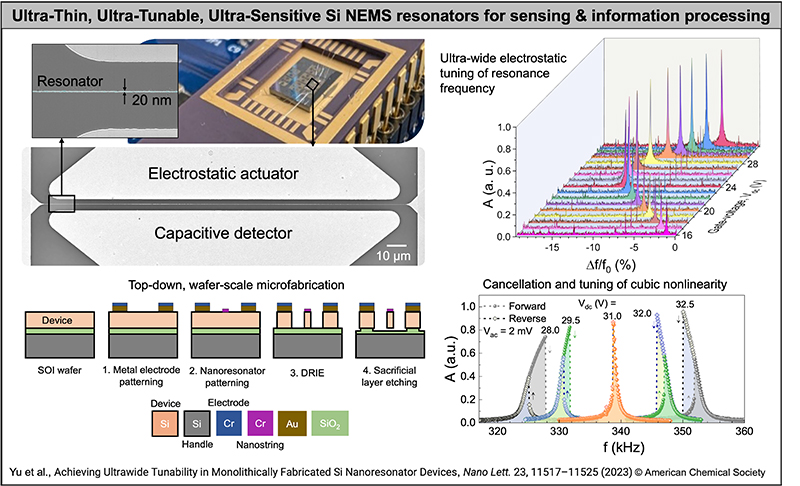Amit Banerjee
Associate Professor, M.Sc., Ph.D
- amit.banerjee

- Areas of Research
- MEMS/NEMS, Nanomechanics, Ultrasensitive sensing, Reservoir-Computing, Si/Diamond/Graphene devices
- Profile
- Research
-
Dr. Amit Banerjee is a researcher with broad interests across nanoscience and nanotechnology. He received his M.Sc. and Ph.D. degrees from Indian Institute of Technology (IIT) Kanpur in 2009 and 2014, respectively. He conducted postdoctoral research at City University of Hong Kong (2013-2015), at Kyoto University (2015-2019), and at Japan Advanced Institute of Science and Technology (2019-2020). Dr. Banerjee then joined the Graduate School of Engineering at Kyoto University as a Junior Associate Professor (2020-2025). In May 2025, he joined the Faculty of Engineering at Kyoto University of Advanced Science as an Associate Professor.
Dr. Banerjee’s research primarily focuses on micro/nano-scale systems (MEMS/NEMS) and nanomechanics. He is particularly interested in developing devices for ultrasensitive sensing and reservoir computing (AI) applications. He has coauthored scientific articles in leading scientific journals like Science and Nano Letters. Dr. Banerjee is a recipient of the prestigious JSPS postdoctoral fellowship. He also received multiple competitive research grants from JSPS KAKENHI, Hirose Foundation Research Grant, and Hitachi Kurata grant. Dr. Banerjee is passionate about Science and Engineering education and enjoys exploring innovative teaching methods. He likes to go on long walks and watch foreign movies in his free time.
-
Building “Nano-machines” for a nanotechnology-driven future society
Nanotechnology is playing a crucial role in shaping future human society, as immense progress in this field has brought nano-scale devices capable of unprecedented tasks out of the realm of fiction. Nano Electro-Mechanical Systems (NEMS) are a class of emerging devices that cleverly integrate exotic electrical and mechanical phenomena at nanometer scale on tiny semiconductor chips for developing a variety of extraordinary applications like ultrasensitive sensing, high-frequency signal processing, intelligent information processing, quantum computation, etc. At the core of a typical NEMS device lies a suspended nano-mechanical structure (usually measuring 1 – 100 nm in at least one dimension) and NEMS devices derive their extraordinary functionalities by exploiting mechanical motion (deformation) induced in this nanostructure, effectively functioning as nano-scale machines. A concrete example of such a nano-machine will be a NEMS resonator, where an integrated nanostructure is electromechanically vibrated at very high-frequency (~ 1 MHz) in one of its resonance modes. One can think of these NEMS resonators as miniaturized versions of the familiar spring-mass oscillatory system, offering unique properties and novel applications stemming from their nano-scale size. Despite this apparent simplicity, developing NEMS resonator devices presents a challenging yet exciting endeavor. This involves creating a suitable fabrication process, inducing controlled mechanical motion at nanometer scale, accurately converting and reading the corresponding faint electrical signals, and thoroughly understanding their rich dynamic behavior. Researching in this area is particularly important because of the widespread potential application of these NEMS devices across many emerging areas like ultrasensitive sensing, efficient computing and artificial intelligence, electronics, healthcare, etc.

Tunable, ultra-thin Si NEMS resonator devices developed by Dr. Banerjee and his colleagues
Dr. Amit Banerjee has years of hands-on experience in the development of NEMS and MEMS devices (their micrometer-scale counterparts) using various materials like Si, Diamond, Graphene, and others. Dr. Banerjee’s expertise in this area encompasses various aspects of NEMS/MEMS device development including design, simulation, microfabrication process development, device characterization and characterization platform development, nanomechanical and electromechanical testing, theoretical modelling of linear and nonlinear dynamic behavior, etc. He is particularly interested in developing NEMS/MEMS devices for ultrasensitive sensing and physical reservoir-computing-based intelligent information processing applications. Dr. Banerjee has coauthored research articles in leading scientific journals like Science and Nano Letters, presented his research in reputed international conferences, and led NEMS/MEMS development projects as Principal Investigator, funded by competitive research grants like JSPS KAKENHI, Hirose Foundation, Hitachi Kurata grant. He is also a recipient of the prestigious JSPS postdoctoral fellowship. Dr. Banerjee welcomes inquiries from students interested in this fascinating research area. He also invites entrepreneurs, start-ups, and potential industry partners to consult or collaborate, and encourages fellow academic researchers interested in joining forces. Please feel free to reach out to him.
